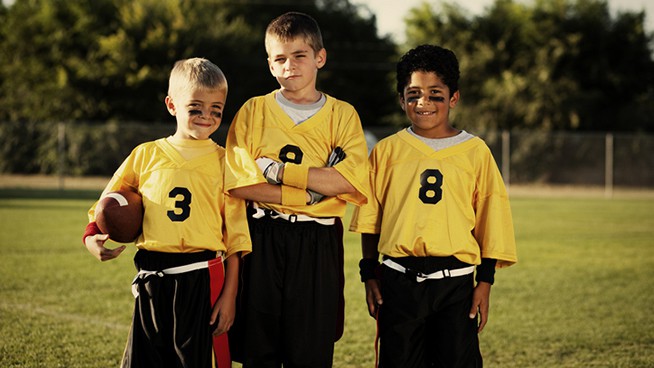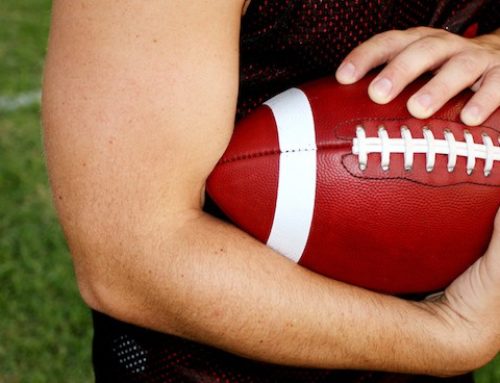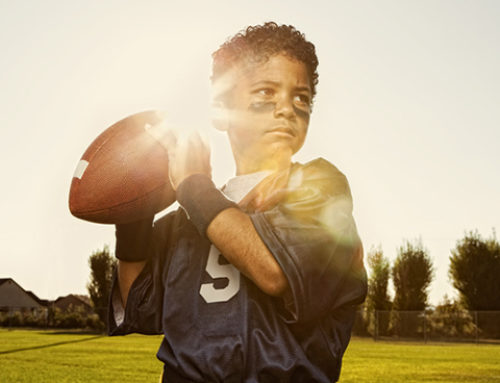How to ‘Keep Your Cool’ on the Football Field
You need to learn to keep your cool on the football field. It’s an aggressive and intense game, but there’s no excuse for losing your temper because of a bad call, or worse, a teammate’s play.
Allowing it to affect you beyond the moment of the play is a sure way to lose focus or shift your focus to a bad spot. When some coaches see a player losing his focus, they often attack that player on the next play with a double team or a trap block to further alter the player’s focus and emotion.
That frustration will spread to teammates and can affect the entire team’s outlook. Suddenly, you’re facing even worse problems. Many times, a player or teammate who feels wronged will retaliate and garner further penalties. All this leads to a further shift in momentum to your opponent.
RELATED: How Sport Psychology Improves Athletic Performance
Sooner or later, a suspect call or missed call will go back your way and change everything, so don’t lose your mind.
Player frustration is an inevitable part of the game. At some point all players become frustrated, but learning to handle those emotions or feelings of frustration are a sign of maturity. A player who can shake off a bad call or play will also influence his teammates, spurring a potential rally.
Don’t think for one minute that a pro QB who is driving his team down the field in the final minutes of a game is not dealing with the same feelings as a high school kid playing Friday night. But can you imagine a pro QB jumping up and down and slamming his helmet on the ground? I don’t think so.
Many coaches, myself included, set up drills in practice to frustrate players, to teach them how to control negative emotion. Phil Jackson once said he would set up scrimmages between the starters and bench players, and he wouldn’t call fouls against the back-ups. This caused great frustration for the starters, but it taught them to deal with these emotions.
Practice your emotional control during the week so when you are on the field you can better understand your own emotions. That control will help your game as much as any skill drill. Learn to be Joe Cool on the field.
Check out 6 sports anger management tips to stay calm in the heat of the moment.
[cf]skyword_tracking_tag[/cf]RECOMMENDED FOR YOU
MOST POPULAR
How to ‘Keep Your Cool’ on the Football Field
You need to learn to keep your cool on the football field. It’s an aggressive and intense game, but there’s no excuse for losing your temper because of a bad call, or worse, a teammate’s play.
Allowing it to affect you beyond the moment of the play is a sure way to lose focus or shift your focus to a bad spot. When some coaches see a player losing his focus, they often attack that player on the next play with a double team or a trap block to further alter the player’s focus and emotion.
That frustration will spread to teammates and can affect the entire team’s outlook. Suddenly, you’re facing even worse problems. Many times, a player or teammate who feels wronged will retaliate and garner further penalties. All this leads to a further shift in momentum to your opponent.
RELATED: How Sport Psychology Improves Athletic Performance
Sooner or later, a suspect call or missed call will go back your way and change everything, so don’t lose your mind.
Player frustration is an inevitable part of the game. At some point all players become frustrated, but learning to handle those emotions or feelings of frustration are a sign of maturity. A player who can shake off a bad call or play will also influence his teammates, spurring a potential rally.
Don’t think for one minute that a pro QB who is driving his team down the field in the final minutes of a game is not dealing with the same feelings as a high school kid playing Friday night. But can you imagine a pro QB jumping up and down and slamming his helmet on the ground? I don’t think so.
Many coaches, myself included, set up drills in practice to frustrate players, to teach them how to control negative emotion. Phil Jackson once said he would set up scrimmages between the starters and bench players, and he wouldn’t call fouls against the back-ups. This caused great frustration for the starters, but it taught them to deal with these emotions.
Practice your emotional control during the week so when you are on the field you can better understand your own emotions. That control will help your game as much as any skill drill. Learn to be Joe Cool on the field.
Check out 6 sports anger management tips to stay calm in the heat of the moment.











